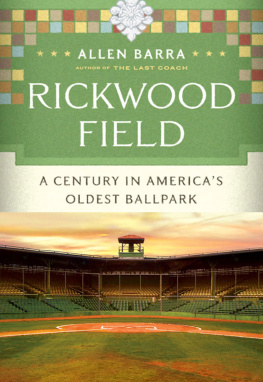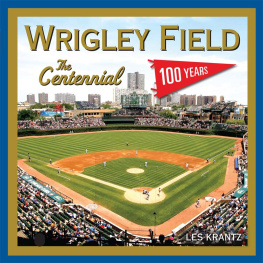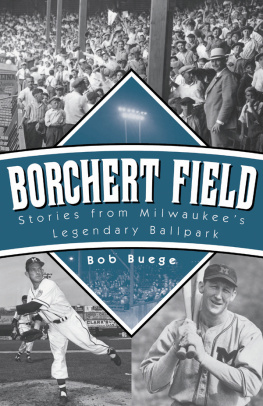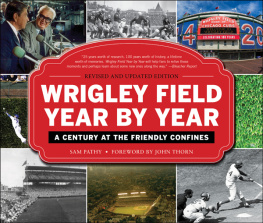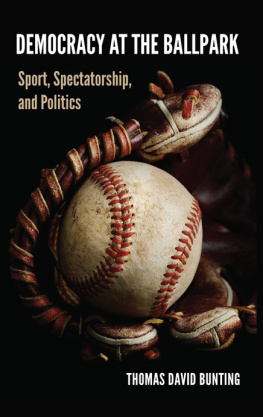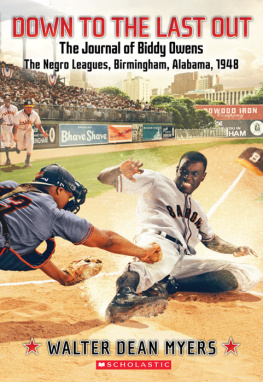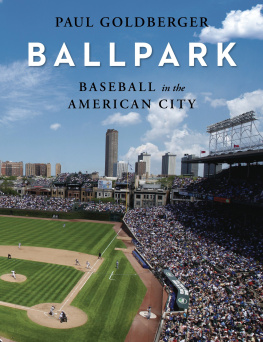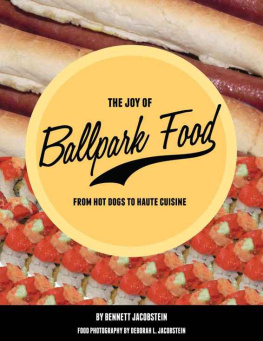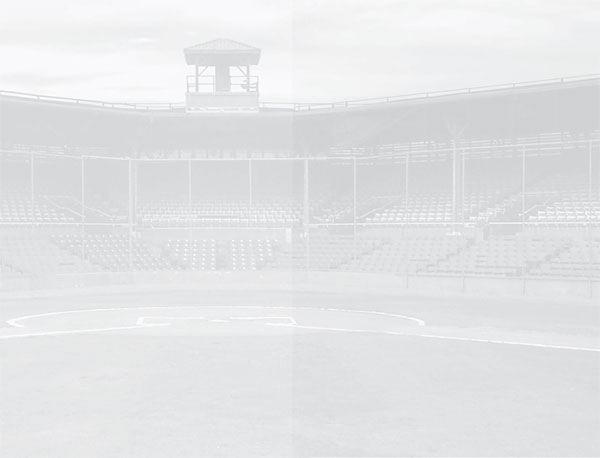W. W. NORTON & COMPANY . NEW YORK LONDON
Selections from Rickwood Field by Debra S. Robertson reprinted by permission of the author.
For information about permission to reproduce selections from this book, write to Permissions, W. W. Norton & Company, Inc., 500 Fifth Avenue, New York, NY 10110
Barra, Allen.
Rickwood Field: a century in Americas oldest ballpark / Allen Barra.
p. cm.
Includes bibliographical references.
1. Rickwood Field (Birmingham, Ala.)History. 2. Birmingham
Barons (Baseball team)History. 3. Birmingham Black Barons
(Baseball team)History. 4. Minor league baseballAlabama
BirminghamHistory. 5. Historic buildingsAlabama
Birmingham. I. Title.
W. W. Norton & Company, Inc.,
500 Fifth Avenue, New York, NY 10110
www.wwnorton.com
W. W. Norton & Company, Ltd., Castle House, 75/76 Wells
Street, London W1T 3QT
CHRIS FULLERTON .
PREFACE
O N A PRIL 12, 1909, the atmosphere at Shibe Park was that of a worlds fair. The seating capacity for Philadelphias brand spanking new baseball stadium, named for majority team owner Benjamin F. Shibe, was around 20,000, but in the great tradition of Philadelphia sporting events, thousandsone paper suggested as many as 10,000 morelined up at the entrance on the corner of Lehigh and Twenty-first Street to pay for standing room only. According to baseball historian Lawrence S. Ritter, Additional fans crowded onto rooftops on the other side of 20th Street, beyond the right-field fence, because there wasnt room to shoehorn a single additional customer within the confines of the ballpark.
There were so many celebrities at Shibe ParkDiamond Jim Brady, western silent film star William S. Hart, and frontier lawman turned sportswriter Bat Masterson were said to be in attendancethat the Philadelphia Athletics already legendary manager and owner, hardly noticed the slender, soft-spoken southerner in his early thirties who was wearing a straw hat identical to his own.
Ring Lardner, not yet a nationally known sportswriter and writer of short fiction but a reporter for the Chicago Inter-Ocean and also wearing a straw boaterchatted with the young man and took it upon himself to introduce him to the second most famous manager in baseball (behind the New York Giants John McGraw, of course). They shook hands.
Allen Harvey Woodward, known to his friends for reasons no one could remember as Rick, had taken the train all the way from Birmingham, Alabama, to witness the christening of Philadelphias new marvel, the first concrete-and-steel sports structure in America. Might Mr. Mack, the younger man wanted to know, have a while to talk with him about his amazing new ballpark? He was, Woodward told Mack, planning to build a similar structure back in Alabama. Mack liked Woodward immediately; he suggested they have dinner the following night at Philadelphias most famous restaurant, Bookbinders.
The next day, following the Athletics 81 victory over the Boston Red Sox, the two men sat down to dinner. Woodward quickly expressed his admiration for his host. Connie Mack was what Rick Woodward wanted to be: a real baseball man. Mack had actually been a ballplayer, though not much of a hitter; he had a batting average of .245 in 723 big-league games, most of them as a catcher. He was, however, a smart and good defensive catcher and eventually worked his way up to managing and the nickname of the Tall Tactician.
Most baseball fans, even those who had never seen him, knew that he was one of the few managers to wear street clothes in the dugout and that he often positioned his players by waving a scorecard. They also knew that his Athletics had won American League pennants in 1902 and 1905, where in just the second World Series in baseball history they lost to McGraws Giants when Christy Mathewson beat them three times by shutout.
Ricks father, Joseph Hersey Woodward, was one of Birminghams iron barons; the team would actually derive its name from the coal barons of the 1880s, but by the time of Rick Woodward many felt the term iron barons was more appropriate. He regarded baseball as a symptom of moral degeneracy. There was some basis for old Joes fears. Young Rick had caught baseball fever as a boy when his uncle, less concerned about elements of moral degeneracy, had taken his nephew to exhibitions of barnstorming major league players. At the University of the South, Suwanee, he had, like Mack, become a catcher and grown so absorbed in the game that his grades suffered. Joe Woodward yanked his son out of Suwanee, brought him home, then sent him off to MIT for a B.S. in mining engineeringwhich would help him prepare for his destiny as future owner of the Woodward Iron Company. Had he known what Rick would be remembered for a hundred years later, he would still be spinning in his grave.
Mack was supportive but expressed his skepticism. Were there really enough baseball enthusiasts in the South, in Birmingham, Alabama, he wondered, to support a team with such a park? Woodward assured him that there were, that the citizens of Birmingham, white and black alike, were as baseball mad as the good people of Philadelphia or any other city in the sixteen major leagues, which, placed on a map, all fit into the northeastern quarter of the country.
Though Woodwards proposed ballpark would be smaller than the awe-inspiring Shibeit would be home to Woodwards team, the Barons, a minor league affiliate of the Southern Leagueit still promised to be an enormous undertaking. But Woodwards mind was set. Mack promised to visit Birmingham and lend his expertise, and, within a couple of months, he would be as good as his word.
Woodward was delighted and now more determined than ever to build the first steel-and-concrete ballpark in the Southin fact, in all of minor league baseball.
There was no way either man could have known that Rickwood Field, its name appropriated from syllables in the owners first and last name, would outlast not only Shibe Park but every other major and minor league ballpark standing in 1910. Nor could they possibly have envisioned that its grass would be touched by the cleats of more great players, both dead-ball era and modern, American and National League, white, black, and Hispanic, than any other park the game has ever seen: Babe Ruth, Ty Cobb, Rogers Hornsby, Dizzy Dean, Josh Gibson, Satchel Paige, Cool Papa Bell, Willie Mays, Hank Aaron, Reggie Jackson, and Frank Thomas to name just a few.

